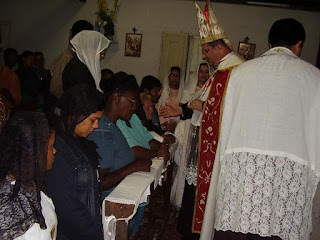Bishop Fernando Areas Rifan was ordained a priest by Bishop Antonio de Castro Mayer on December 8, 1974, and has been celebrating the Traditional Mass (the Mass in the extraordinary form of the Roman Rite) since then. As the Bishop of the only Particular Church exclusively dedicated to the celebration of all the sacraments according to the ancient use of the Roman Rite (the Apostolic Administration of Saint John Mary Vianney, in Campos, State of Rio de Janeiro, Brazil), we have asked him certain questions regarding the application of the Apostolic Letter given motu proprio Summorum Pontificum.
Bishop Fernando Rifan, we now know the contents of Summorum Pontificum and of the papal explanatory letter. Many Traditional Catholics throughout the world, though filled with gratitude to the Pope, believe that, despite the changes, they will remain hostages of a hostile situation, as happened with the motu proprio Ecclesia Dei, whenever their diocesan ordinary does not wish to comply with the papal will. What does the new motu proprio generally change, in relation to the indult system established by John Paul II with Quattuor Abhinc Annos and the motu proprio Ecclesia Dei?
There will always be hardships. The cross is, indeed, one of the signs of God’s blessings. Yet this Motu Proprio is quite different from the previous one on the Mass of Saint Pius V. The other counseled; this one mandates, gives precise rules. And it places an instance in the Roman Curia for appeals in case of litigation or of the non-fulfillment of what is ordered in it.
As far as you understand them, could you give us an overview of how the general procedure would work out for the groups of faithful, the steps the stable groups would have to take to have access to the Mass?
First, the faithful who wish to attend the Holy Mass in the extraordinary form will have to follow the procedures indicated in the Motu proprio. As a first step, they should look for a priest willing to celebrate it privately, and even try to convince him, which will be easier since he has all liberty to do so. And they may attend his Mass.
With the growth of the group, they may ask the parish priest for a public Mass in the parish church, particularly on Sundays. And, finally, they may attain from the Bishop a personal parish, which would be the maximum ideal, with Masses, catechism, spiritual direction, parish movements, etc., with the Mass of Saint Pius V.
Are there any procedural safeguards for the faithful and Priests who want access to the Mass?
According to the Motu Proprio, the Bishop cannot prevent a priest from saying such Mass privately, nor a group of faithful from attending it (art. 2 and 4). Neither can he do anything against the Motu proprio. If he does, appeal to Rome is applicable.

Your Excellency, we are particularly interested in Art. 7 of Summorum Pontificum, which states: ["Art. 7 If a group of lay faithful, as mentioned in art. 5 § 1, has not obtained satisfaction to their requests from the pastor, they should inform the diocesan bishop. The bishop is strongly requested to satisfy their wishes. If he cannot arrange for such celebration to take place, the matter should be referred to the Pontifical Commission 'Ecclesia Dei'."] Can a layman also appeal to the Commission, does he have standing to appeal to Rome if the Ordinary refuses to refer the matter to Rome?
Not only the priests, but also the lay faithful may appeal to the Pontifical Commission Ecclesia Dei, which has papal authority to solve these matters.
Assuming that a layman can appeal to the Ecclesia Dei commission directly, in the case of Art. 7, does the Commission have the power to solve the problem?
It is clearly expressed by the document that the Pope has just endowed the Pontifical Commission Ecclesia Dei with wider powers than it had before, as it can be seen from art. 12: "the authority of the Holy See, supervising the observance and application of these dispositions."
Bishop Rifan, in the Explanatory Letter, Pope Benedict says that, "in order to experience full communion, the priests of the communities adhering to the former usage cannot, as a matter of principle, exclude celebrating according to the new books". Even though this is not part of the legal text, does it mean that the priests in these communities dedicated to the Extraordinary Form may be forced to celebrate rites according to the Ordinary Form?

No one will be forced to celebrate in the new rite. But the possibility cannot be excluded in principle. Even if the Mass in the rite of Saint Pius V is celebrated exclusively, as we do here in our Apostolic Administration by concession of the Holy See, the possibility of celebrating in the ordinary rite cannot be excluded as a matter of principle - it is a matter of coherence, that is the argument of the Pope.
To exclude the celebration in a Catholic rite approved by the Church as a matter of principle would not be a manifestation of the Catholic spirit, and more, if as a matter of questioning the catholicity of the new rite, then it would be a position with incorrect theological implications, because the catholicity of a rite universally proclaimed for the entire Church by its Supreme authority and preserved by the Teaching Church would be put in doubt.